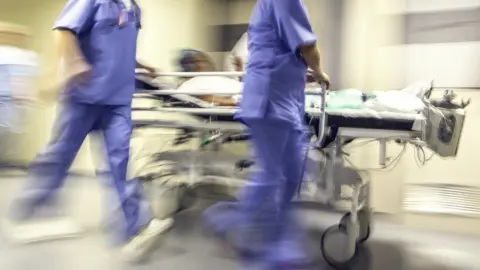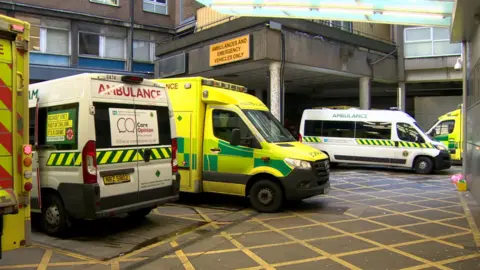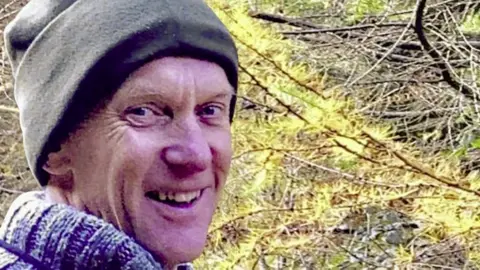NI health review 2022: From pandemic to industrial action
 Getty Images/VM
Getty Images/VMThe dawn of a new year usually brings optimism but the Covid-19 pandemic has meddled with all that and the start of 2022 was no different.
We started the year talking about Omicron which was quickly identified as being significantly more transmissible than Delta, the preceding variant of concern.
Within weeks, as the Omicron wave travelled around the world, it replaced Delta as the dominant variant and spread at an exceptional rate.
More than 300 people were hospitalised over Christmas 2021 and 34 spent the new year in ICU.
As this year draws to a close, Group A streptococcus has replaced Omicron in the headlines and although the number of cases has started to fall slightly, parents everywhere remain vigilant.

Hospitals, GP surgeries and community care have all buckled under increased pressure.
Earlier this month, BBC News NI filmed inside the Royal Victoria Hospital's emergency department and it revealed a system that was broken and staff who were burnt out.
Lead nurse Claire Wilmont said "providing dignified care in overcrowded emergency departments is a daily challenge".
Claire added that staff struggle daily to find space to "treat the sickest of the sick, including resuscitating patients".
The pictures were shocking, the stories harrowing, but without a working government and a health minister, it's hard to know what the response will be.
Northern Ireland's hospital waiting lists remain the highest in the UK, including those for gynaecological surgery.
Some stories stand out including that of Claire Nicholls who waited almost four years for surgery for endometriosis.
Claire told BBC News NI that the delay caused damage to her reproductive organs which may affect her ability to have children.

After several years of being in the wilderness - it seems Bengoa's report for reshaping hospital services is finally starting to see light.
There was a positive response to the creation of three dedicated surgical hubs which will tackle waits; they will be based at the Mater, Daisy Hill and South West Acute Hospitals.
To gain the title, the latter two hospitals have had to "temporarily" give up emergency general surgery.
By separating planned surgery from emergency surgery it's hoped waiting lists can be tackled and planned surgeries will not be affected by emergencies.
Some of the public in Newry and the south west weren't convinced by the proposed changes - and in Fermanagh, they took to the streets in protest.

2022 has been a year of public inquiries including Muckamore, neurology, urology and the National Covid Inquiry.
Rarely do inquiries yield the answers the public want, instead they tend to linger for years.
Two inquiries continue to dominate local headlines, hyponatraemia and neurology.
In June the Neurology Inquiry found that the Belfast Trust failed to intervene quickly enough in the practice of a doctor which led to Northern Ireland's largest-ever patient recall.
More than 5,000 former patients of neurologist Dr Michael Watt were invited to have their cases examined for possible misdiagnoses.
The inquiry found numerous failures.
A review of the clinical records of 44 patients who died under the care of Michael Watt found "significant failures" in their treatment and "poor communication with families".
The regulator, the RQIA's Christine Collins, said the outcome of the review was "shocking and gut-wrenching".
While that headline was vindication for families, within days they called for a police investigation.
Colin Armstrong's late mother, Ruth, was misdiagnosed by Michael Watt in 2001 and prescribed medication for epilepsy.
He said the report was "limited in its scope" and was just the "beginning of the work that needed to be done".
 Roberts Family
Roberts Family Alan and Jennifer Roberts are another family who have said they have been let down by the health service.
For 21 years they've sought justice for their daughter Claire's death in 1996 - this year a doctor involved in her care, Heather Steen was struck off - again the Roberts family have said this is just the start of legal action.
It was another busy year for GPs as they were involved in the roll-out of boosters and flu vaccines.
While many people said they had problems accessing one, Dr Frances O'Hagan told BBC News NI that the main reason was low staffing.
The number of practices has fallen by about 9% and nine surgeries handed back their contracts.

Who can forget the happy face of five-year-old Daithi MacGabhann on the steps of Stormont after the legislation to bring opt-out organ donation was passed in February in Northern Ireland.
It means people will automatically become donors unless they specifically state otherwise.
As the year draws to a close there are flashbacks to 2019 when, like then, we are bang in the middle of industrial action by health workers over pay and conditions and there is no working government.
This time though strikes are happening at a national level and there is a cost-of-living crisis.
In Northern Ireland, the executive ceased to function in October and a breakthrough seems a long way off.
